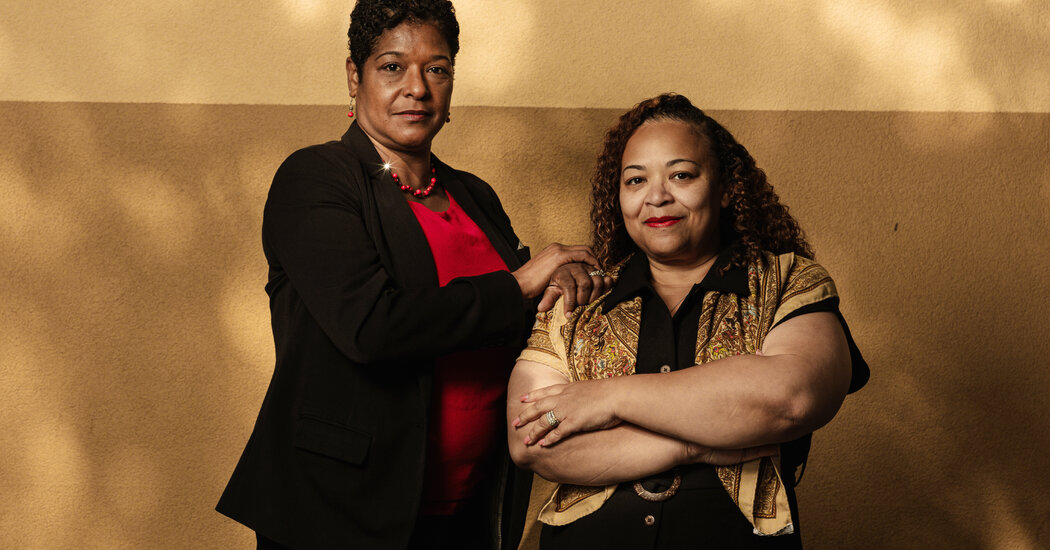To some Black families, it was an intimately familiar arrangement.
A woman whose parents fled a life of sharecropping in the South was among the first in her family to achieve a prestigious career. She extended her help to relatives who had less, even buying a home for a grandniece in need of stability.
The house sits at the center of the indictment of Letitia James, the New York attorney general, by the Justice Department. She was accused of misrepresenting the purpose of the property, a $137,000 home in Norfolk, Va., when she purchased it in 2020.
The prosecutor who secured the indictment, a Trump loyalist who once served as his defense attorney, said that the charges chronicle “intentional, criminal acts and tremendous breaches of the public’s trust.” Ms. James faces the possibility of decades in prison if convicted. On Friday, she pleaded not guilty to those charges in federal court in Norfolk, Va.
But in some ways, the basic contours of the case illuminate another story about the experience of Black women in America, a story that rang familiar to a small contingent of influential Black women leaders who began privately rallying around Ms. James in the hours after her indictment.
Millions of U.S. adults provide care for relatives and friends, and many more pitch in to help loved ones by providing money, housing, child care and other needs in moments of hardship. It is often a defining practice for Black women, academics and economists say.
Across the country, working women have increasingly emerged as the breadwinners for their immediate households over the last half-century. Black women in particular, data consistently shows, are more likely than any other racial or ethnic group to serve as the primary earners for families.
A vast body of research, including academic studies and national surveys by Goldman Sachs, suggests that many upwardly mobile Black women and men feel a steep cultural obligation and sense of racial responsibility to provide assistance to extended relatives, even at their own expense, a phenomenon so common that it has become known as “the Black tax.”
“Letitia James would be among the many Black women that support their families,” said Sara Estep, an economist at the Center for American Progress, a liberal think tank in Washington that has tracked the issue for years.
It is a tradition that Ahtis Davis, an executive at a financial services firm, knows well: She pitched in to help her father financially when he had cancer. When her grandmother lost her home to foreclosure, she was still in college but nonetheless helped cover expenses when other relatives could not.
Ms. Davis, a divorced mother of two, said it has at times meant fewer resources for her own children. But helping others was ingrained in her at a young age, when her family practiced tithing at church. And she has no regrets.
“There’s a culture of lift as you climb and look out for your family, look out for your community, help however you can,” Ms. Davis said. “To be punished for that, it definitely feels like an attack and a disregard for our communities.”
The case has captured the attention of many Black women for both its precise details and its broad implications. President Trump has recently targeted several other Black women in powerful positions, including Lisa Cook, a member of the Board of Governors of the Federal Reserve, and Fani T. Willis, the Georgia prosecutor who led an election interference case against him.
As the Trump administration slashes the federal work force, Black women, who make up roughly 12 percent of it, have been disproportionately affected. The unemployment rate for Black women, who are among the country’s most educated, has jumped during the past year.
“This president just seems to have a natural distaste for Black women, and he’s showing it more and more,” said Lupe Todd-Medina, a Democratic strategist in New York and founder of Effective Media Strategies, who has known Ms. James for more than two decades.
Prosecutors said that Ms. James committed bank fraud and made false statements related to the home she purchased in Norfolk, accusing her of falsely claiming in loan documents that it would be a secondary residence and using it instead as a rental investment property.
Her grandniece testified to a grand jury in June that she did not pay rent, and that Ms. James had even covered basic upkeep, The New York Times reported. Ms. James, in an unrelated news conference with Gov. Kathy Hochul last week, called the indictment “retribution for basically doing my job,” and said she had done nothing wrong.
“I visit Norfolk quite frequently. My family is in Norfolk,” Ms. James said. “I love my family.”
(The salary for the state attorney general was about $220,000 in 2022, according to the Council of State Governments, a nonprofit that tracks the numbers across the country.)
To some, the arrangement recalled stories shared for decades about the “Black tax.”
A widely shared social media post by a Black female entrepreneur regarding her peers — who are often the first in their family to “make it” — once put it succinctly: “Their money isn’t just their money. Their money is mom’s light bill money, little bro’s football money.”
“I think it’s in our genetics,” Tyquana Henderson-Rivers, the founder of Connective Strategies and a political consultant who has known Ms. James for nearly three decades, said. “Sometimes, it costs us more than we anticipated having to pay.”
Jasmine D. Hill, an assistant professor of public policy and sociology at the University of California, Los Angeles, said that the practice emerges partly out of basic need.
Black middle-class adults are significantly more likely than their white peers to have a sibling who is poor, research shows. And the nation’s racial wealth gap remains huge: Median wealth for white households is more than $240,000 greater than that of Black households, recent federal data shows.
Dr. Hill noted that experts say that it is unclear who participates most often in informal assistance to extended family members. But she added that this practice can be especially connected to one’s sense of identity in Black communities.
In research on the issue, Dr. Hill found that even those “on the verge of economic ruin themselves” sometimes provided significant financial support to immediate and extended relatives, pulling from emergency savings and emptying retirement accounts.
“Black families, and Black women particularly, have had to figure out ways to essentially be an unhonored social safety net in the United States,” she said.
Hours after Ms. James was indicted, a number of influential Black female figures, including the former MSNBC television host Joy Reid, convened to strategize over “how are we going to protect our own,” said L. Joy Williams, the president of the NAACP New York State Conference who organized the call.
The participants considered how much Ms. James’s legal defense might cost and ways to provide long-term support. The call was filled with an air of indignation and a measure of unease.
Ms. James had purchased the modest homes as a “safe space” for family members so that they and their children could go to school and have a sense of security, said Karen Finney, a political strategist and commentator who discussed the indictment on a recent podcast in which she was interviewed by Ms. Reid.
“We’re talking about someone who is doing the things you’re supposed to do,” Ms. Finney, who is also Ms. James’s cousin, said. “Who is saying, ‘I’m going to take care of family.’”
The case resonated with Rita Joseph, a City Council member in New York, who was born in Haiti and spent much of her childhood in Flatbush, a Brooklyn neighborhood that is home to thousands of Caribbean immigrants.
She recalled her grandmother’s insistence that extended relatives — many of them recent arrivals to New York — stay with her until they could find work and settle into the city.
“Our home was like a revolving door until everybody else got on their feet,” Ms. Joseph said, calling it a routine practice for Black women. “We pull up and we’re like, ‘Sister, we’re going to help you for six months until you get yourself together.’
“And then we make space for the next person.”
Troy Closson is a Times education reporter focusing on K-12 schools.
Jeffery C. Mays is a Times reporter covering politics with a focus on New York City Hall.
The post In Letitia James Case, Some Black Women See Their Own Family Sacrifices appeared first on New York Times.




